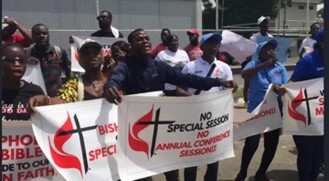On October 15, 2024, Bishop Samuel Quire, Jr. of the United Methodist Church (UMC) in Liberia made it clear that the Church will not endorse same-sex marriage, following protests against this issue. The unrest among church members occurred after the reported removal of a clergy member known for his opposition to same-sex marriage and rumors of an impending gay marriage service within the church. Addressing reporters after the protests, Bishop Quire emphasized the Church’s unwavering stance against same-sex unions, maintaining that UMC is rooted in traditional Christian values as defined by the Holy Bible.
Bishop Quire articulated that the UMC is not a gay Church and will never adopt that identity. He reaffirmed the Church’s commitment to the belief that marriage is a sacred union strictly between one man and one woman, devoid of any ambiguity or deviation. He categorically dismissed rumors suggesting he might facilitate a same-sex marriage, thus reiterating that the Church intends to uphold its foundational doctrine and values, which are in alignment with cultural perceptions and biblical interpretations of marriage.
The Bishop pointed out that his position and the Church’s doctrine are firmly opposed to same-sex marriage and underscored that the UMC does not support the recently proposed “New Regionalization Laws,” which allegedly mandate pastors to perform same-sex marriages. Despite the tensions and protests, Bishop Quire maintained that the Church’s leadership stands firm against any form of endorsement for gay marriages or the ordination of members of the LGBTQ+ community within their ranks. His comments reflect a commitment to preserving the Church’s identity and values in the face of increasing societal changes regarding marriage equality.
In light of the controversy surrounding the suspension of two pastors who allegedly violated Church regulations, the Bishop confirmed the disciplinary actions taken against them. However, he did not disclose specific details about the alleged transgressions, citing “administrative reasons.” This lack of transparency has raised questions among church members about the nature of the violations and how they align with the broader issues of the Church’s stance on LGBTQ+ matters, showcasing a potential divide between the leadership and the congregants regarding interpretation and application of Church doctrine.
Bishop Quire’s declarations echo a broader trend within conservative religious communities resisting changes to traditional marriage definitions. The UMC, like many other denominations, faces the challenge of balancing long-standing beliefs with contemporary social movements advocating for LGBTQ+ rights. The protests and tension within Liberian Methodism underscore the complex landscape of faith, culture, and human rights, as congregants are increasingly pressured to grapple with the implications of inclusion versus exclusion in their spiritual communities.
In summary, the Bishop’s statement and the ensuing protests highlight a significant moment of contention between institutional religious beliefs and evolving societal norms surrounding marriage and sexuality. Bishop Quire’s firm rejection of same-sex marriage and reaffirmation of traditional values serves as a crucial element in the ongoing dialogue about the role of the Church in the modern world, particularly in regions like Liberia where cultural and religious identities are tightly intertwined with issues of morality, ethics, and individual rights. The United Methodist Church in Liberia faces a pivotal moment as it navigates this ongoing debate, with potential repercussions for its unity, members, and relation to broader social changes in the region.














